Index relies entirely on the support of donors and readers to do its work.
Help us keep amplifying censored voices today.
[vc_row][vc_column][vc_column_text]
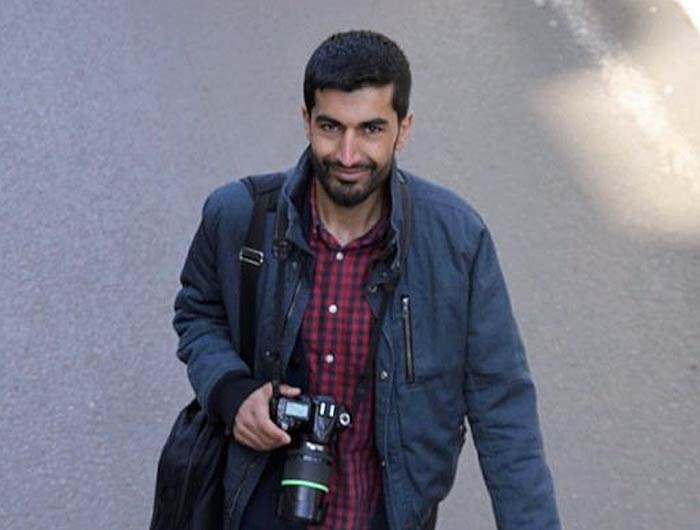
Nedim Türfent has been under detention for more than 18 months. The 5th hearing of his trial will be heard on Dec. 15 at the Hakkari Courthouse. © Mezopotamya Agency
“If we wanted to do, we could kill you right here and then say you were killed during the incidents. No one would be able to prove otherwise.”
That’s what police officers told journalist Nedim Türfent when they arrested him more than 18 months ago.
During the fourth hearing in his trial in the southeastern province of Hakkari on Friday 17 Nov, Türfent, a local correspondent and English news editor for the Dicle News Agency, informed the court about the abusive treatment he had suffered at the hands of authorities. The case had already attracted attention after 19 of 20 witnesses confessed to testifying against Türfent under torture and duress.
Türfent’s description of overt police threats has added more insult to injury in a case that lacks any evidence other than fallacious testimonies. “Don’t worry, we’re going to prepare such a file on you that you’ll be in for at least 20 years. You won’t be getting out anytime soon,” Türfent quoted police as saying during his hearing. The journalist faces up to 22.5 years in prison on charges of “membership in a terrorist organisation” and “conducting propaganda.” His 18 months in detention could be extended further in the next hearing on 15 Dec.
The fierce crackdown on Turkey’s mainstream media has been covered widely. But this has also created a certain “butterfly effect.” As the government dares to imprison renowned journalists in the “west” – Istanbul – the knock-on effect is much greater for Kurdish journalists in the east as they are sent back in time to face the dark spectres of the 1990s: intimidation, death threats, detentions and ill-treatment. The retaliation against Türfent for his journalistic work in his hometown of Yüksekova is one compelling example.
Yüksekova – Gever to the Kurdish locals – sits on a small flat plain that is surrounded by majestic and jagged peaks that pierce the sky. Located in Hakkari, which borders Iraq and Iran, it is the largest urban area in the country’s deprived southeastern corner. Toughened by the landscape, people from Gever are known to be self-resilient, proud and stubbornly uncompromising against any type of pressure – be it extreme weather or government crackdown. The same can be said for Türfent’s journalism. His bold coverage of the military siege and crackdown in the town in March-April 2016 made him a target.[/vc_column_text][/vc_column][/vc_row][vc_row][vc_column][vc_video link=”https://www.youtube.com/watch?v=Yu5HL0b2GwE”][/vc_column][/vc_row][vc_row][vc_column][vc_column_text]One of Türfent’s stories received country-wide media attention when it revealed footage of a commander of special forces inflicting ill-treatment on a group of detainees. “You will see the power of the Turk,” the commander shouted. The story made a tremendous impact, with the prime ministry announcing that it would open a probe over the images.
But then came the death threats, harassment and, eventually, detention for the journalist who broke the story.
“Nedim is being punished for relating the state oppression in Yüksekova during the curfews,” said Nimet Ölmez, a fellow reporter with Mezopotamya Agency, the latest iteration of Dicle News Agency after it and its successor, Dihaber, were closed by decree. “Nedim didn’t have a weapon, a stick or a stone in his hands. All he had was a camera and a pen.”
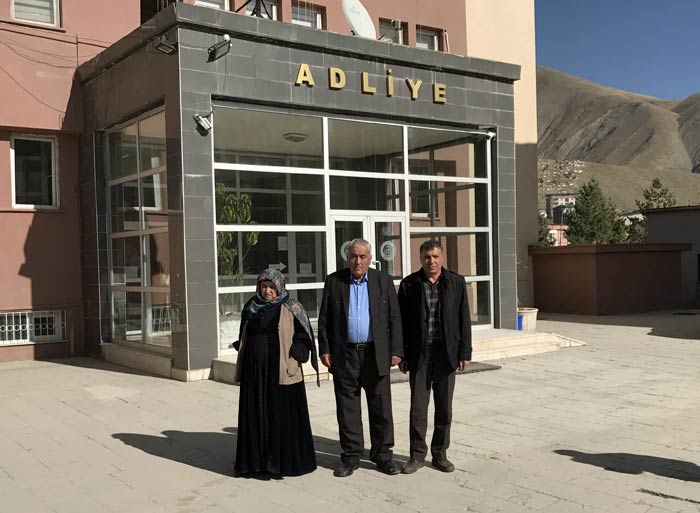
Nedim Türfent’s parents and Diyarbakır-based Free Journalist Society co-chair Hakkı Boltan (R) pose at the Hakkari Courthouse during the fourth hearing of the trial on Nov. 17, 2017 in Hakkari, Turkey. © Özgün Özçer
Fethi Balaman, who started covering the news in Yüksekova for Mezopotamya months after Türfent was detained, explained how his colleague’s work kept the authorities under scrutiny.
“He had a huge network and he could reach anywhere. That scared them. This is why he started to receive more and more threats,” he said. “For instance, they knew that if there was a raid somewhere, Nedim would be informed. What did they do then? They took him so they could do anything they wanted.”
Türfent, who answered our questions from prison through a lawyer, Deniz Yıldız, stressed that it was not just himself but all journalists in the region who were being subject to pressure – pressure that continues even in jail. “As journalists who work in the region, we continuously encounter the cold face of the state when we are outside of prison. The same practices are also reflected once inside.”
More than 200 ongoing cases
Indeed, though compelling, Türfent’s case is just one of many lawsuits against Kurdish journalists. More than 200 probes have been opened against regional journalists, according to Diyarbakır-based Free Journalist Society co-chair Hakkı Boltan.
One of them is Dihaber reporter Selman Keleş, who was detained for taking pictures of Van’s Municipality building after it was surrounded with concrete blocks. Dihaber reporter Mehmet Güleş was also recently sentenced to nine years for “being a member of a terrorist organization” and “conducting propaganda.” Güleş had irritated authorities by reporting about the army’s destruction of homes in his hometown of Şırnak.
Balaman explained that he sometimes has to pass three checkpoints to cover a routine news story. Reporters cannot use a camera anymore, as police and soldiers confiscate them whenever they see one. “When I use a camera, I think about protecting it before protecting myself.”
Türfent is asking for more public awareness and support for the many Kurdish journalists who work across the region. “Our colleagues in the west are confronted with trumped-up indictments. But they have the possibility of moulding public opinion. Journalists who work [here], especially in remote places such as Yüksekova and Cizre, remain in the background.”
The fate of such journalists is a litmus test for defenders of press freedom given the lack of public attention for their plight. “Many colleagues are still waiting for a trial to start two years [after they were detained]. However, there isn’t even a small news story about them,” Türfent said.
Through months of military siege and a state of emergency, local reporters have braved authorities to report on killings, destruction and atrocities that would have been concealed if not for the journalists’ work. But ultimately, the question goes beyond freedom of expression; now, it is the very essence of truth that is at stake.
“Understanding the causes and the results of the Nedim Türfent case means understanding the necessity of freedom for journalists,” said Boltan, demanding more support for Kurdish journalists. “The violations committed here are the source of the pressure on the mainstream media.”
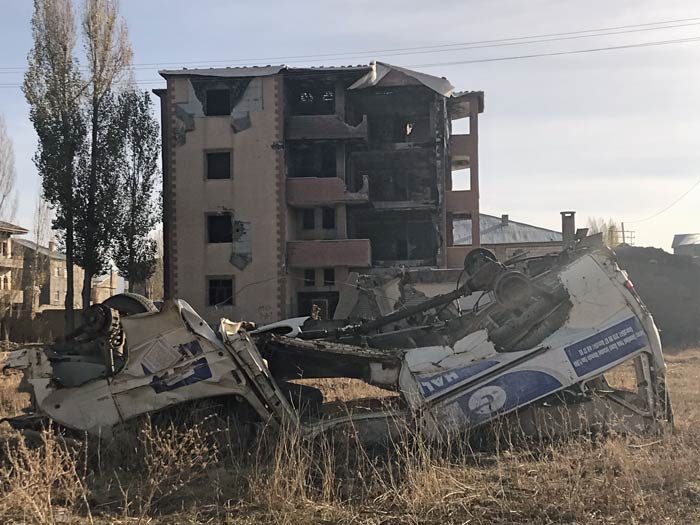
Destruction is still visible in some areas of Yüksekova more than a-year-and-a-half after the military siege. © Özgün Özçer
[/vc_column_text][/vc_column][/vc_row][vc_row][vc_column][vc_custom_heading text=”Mapping Media Freedom” use_theme_fonts=”yes”][vc_separator color=”black”][vc_row_inner][vc_column_inner width=”1/4″][vc_icon icon_fontawesome=”fa fa-times-circle” color=”black” background_style=”rounded” size=”xl” align=”right”][/vc_column_inner][vc_column_inner width=”3/4″][vc_column_text]
Since 24 May 2014, Mapping Media Freedom’s team of correspondents and partners have recorded and verified over 3,600 violations against journalists and media outlets.
Index campaigns to protect journalists and media freedom. You can help us by submitting reports to Mapping Media Freedom.[/vc_column_text][/vc_column_inner][/vc_row_inner][vc_separator color=”black”][/vc_column][/vc_row][vc_row][vc_column][vc_custom_heading text=”Don’t lose your voice. Stay informed.” use_theme_fonts=”yes”][vc_separator color=”black”][vc_row_inner][vc_column_inner width=”1/2″][vc_column_text]Index on Censorship is a nonprofit that campaigns for and defends free expression worldwide. We publish work by censored writers and artists, promote debate, and monitor threats to free speech. We believe that everyone should be free to express themselves without fear of harm or persecution – no matter what their views.
Join our mailing list (or follow us on Twitter or Facebook) and we’ll send you our weekly newsletter about our activities defending free speech. We won’t share your personal information with anyone outside Index.[/vc_column_text][/vc_column_inner][vc_column_inner width=”1/2″][gravityform id=”20″ title=”false” description=”false” ajax=”false”][/vc_column_inner][/vc_row_inner][vc_separator color=”black”][/vc_column][/vc_row]
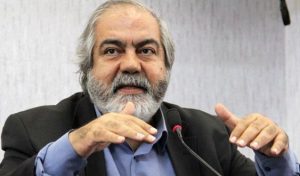 Mehmet Altan is an academic economist, journalist, and author of over 25 books. Altan, who is in detention, stands accused of “attempting to overthrow the government” and “attempting to eradicate the parliament” and they face three counts of life sentences without the possibility of parole.
Mehmet Altan is an academic economist, journalist, and author of over 25 books. Altan, who is in detention, stands accused of “attempting to overthrow the government” and “attempting to eradicate the parliament” and they face three counts of life sentences without the possibility of parole.
Altan, who testified on 19 September through the judicial teleconferencing system from Silivri Prison, mainly addressed the court. The next hearing in his case will take place on 13 November.
Honourable Judges,
The fact that I was arrested on the basis of a charge that is not described in the Turkish Criminal Code – i.e., is not a crime – and that such a legal scandal was then supported by a Criminal Judgeship of Peace, demonstrate from the outset that my imprisonment for over a year has nothing to do with the law.
My imprisonment pending trial on 22 September 2016 — after 12 days in police custody — based on a sentence in an unfounded, untrue news report published as part of an effort to manipulate
public opinion, and the fact that the Criminal Judge of Peace took that same sentence and made it a ground for ordering my pre-trial detention solidified, confirmed and documented this scandalous
process.
And the indictment that finally came out after eight months of imprisonment is a shameful document, which is, contrary to the clear and explicit decision of the Supreme Court of Appeals’ Assembly of Criminal Chamber, based on “presumption” and built on an unattested, one-sentence claim.
It was not just the fact that the court accepted this indictment that surprised me. It was also the interim ruling of the court issued after I presented my four-hour defence statement at the first hearing, and numerous sloppily written, rubber stamp decisions of the Criminal Judgeships of Peace that are against the Criminal Procedure Law, which have been handed down as a result of reviews of the case to order the continuation of my imprisonment and subsequent similar decisions.
Even though I have personally witnessed and seen that the law is nowhere to be found, I still wish, as if the law still exists, to underline once again a few points involving violations, which are too grave to be acceptable from the viewpoint of the law and of which I was a victim.
I am on trial facing three aggravated life sentences on the charges of attempting to overthrow the government, the constitutional order and Parliament over three sentences written in the indictment in bold capital letters that I uttered during a television program airing every Thursday in which we used to discuss and comment on the major developments of the week as
journalists and political commentators, as part of our freedom of expression. Unbelievable. But unfortunately, this is the case.
The long and poorly constructed sentence at the end of page 189 of the indictment constitutes the basis for the illogical and unlawful narrative of this whole accusation. Looking closely at this sentence, one can instantly see how the law is slaughtered.
I would like to emphasize the following before moving to that sentence: There were three topics for discussion on the television program that aired on 14 July 2016. The first was Meral Akşener’s attempt to convene a congress of the opposition Nationalist Movement Party (MHP) and its likely effects on politics and parliamentary dynamics in the run-up to the 2019 elections; the second one was Law No. 6722 on changes on the Turkish Armed Forces Personnel Law and Some Other Laws that had just been published in the Official Gazette; and, the third topic was Ahmet Altan’s newly published novel on the Committee of Union and Progress era, “Dying is Easier than Loving.”
The law that was published in the Official Gazette that morning gave the military powers that were once provided in the abolished Protocol on Cooperation for Security and Public Order (EMASYA). Discussions during the program focused on the risks that would result from moving away from the constitutional order by creating “fait accompli” situations, within the context of the three said topics.
What is more, the 2019 elections are repeatedly emphasized during discussions in the program. Anyone who takes a look at page 187 of the indictment can and does easily see this.
Again, on page 185, there is this quote: “If 50 AKP deputies say, ‘we are joining Meral Akşener in creating a new political party…’” Where is the “coup” here? What coup?
But the prosecutor reaches unlawful and untrue conclusions from that program that would baffle any jurist, or, honestly, anyone with a decent ability to reason. To be more precise, he thinks he reaches those conclusions. As far as the law is concerned, this is a document that will
go down in history as scandalous.
This is the beginning of that fabulous sentence: “… the coup attempt that they knew about …”
How do we know about the coup? There is no proof, no evidence provided.
In addition, is it a crime to know about a coup attempt? It is not.
The very recent decision of the 16th Criminal Chamber of the Supreme Court of Appeals, handed down in a 15 July coup case, answers this question.
With the Supreme Court’s conclusion stated in the decision with register number 2017/1443 and judgment number 2017/4758 that: “Knowledge that an act is to be committed has no bearing on participation… The doctrine endorses the same view. The subject’s knowledge about the act is not sufficient to conclude presence of the will to participate. At the most,
offences in relation to liability stemming from not reporting what he/she knows or participation in preparatory acts may transpire,” the poor, unsubstantiated, feeble indictment has entirely collapsed.
Because the starting point of the indictment is that, based on discussions during the television program, we knew about the coup beforehand. According to the prosecutor, if we say there could be a coup, then we must have jointly participated in the coup attempt with the putschists. Because how else can we say there might be a coup?
So, an academic for 40 years, a writer and a journalist who has been writing about the coups since 1990 cannot anticipate or foresee that there would be severe consequences for abandoning the law, right? Assuming that decision of the Supreme Court of Appeals 16th Criminal Chamber is also ignored, just like the law has been, why is [columnist] Fuat Uğur, who insistently wrote way before the coup attempt on 2 April 2016 that a coup was to take place, not subject to any investigation, if it is a crime to know about the coup beforehand?
Why does the prosecutor not prove that “we knew about the coup,” by offering concrete evidence or documents? He cannot, because it does not exist. The claim that we were talking about the coming coup attempt is nothing but a big lie, an effort to create a false public perception about us.
The falsehood that “they knew about the coup” is a flawed, invalid, shaky ground on which the prosecutor attempts to build the whole narrative and unlawfulness of the indictment.
Can people be oppressed and their lives be messed around with by throwing around presumptive guesses, lying, making up accusations? Of course not.
The Supreme Court of Appeals’ Assembly of Criminal Chamber decision dated 19 April 1993 states that “reaching a conclusion on the basis of assumptions, estimates is certainly against the purpose of criminal procedure.”
Is the case law of the supreme courts binding on the judicial system or not?
I wish to believe that it is.
The prosecutor’s opinionated sentences continue: “That there is a system of political and societal chaos which allegedly constituted the reason for the act of the perpetrators who participated through use of violence…”
Let’s stop here for a minute. The opposite is stated in discussions during the program. The discussions are out there for everyone to see and hear. It is stated persistently and repeatedly that creating “fait accompli” situations and departures from fundamental principles of the rule of law, as in the case of EMASYA, would disrupt the legitimate order and the
politicians are warned along these lines.
Let me cite the following remarks I made during the program so as to prove my point more clearly: “…believing that you will take over a state by committing a crime with a mentality not abiding by the law… If that state is going to continue to exist, then this is recklessness… Because when you want to take over the state, you want to destroy a metabolism. And that metabolism has its own [defensive] reflex… You cannot destroy these. If you do, then the state and society would be destroyed in the process, too.”
How can such an empathic rejection of both military and civilian putschism be seen as putschism?
It is very difficult, even in circumstances where there is a strong malicious intent and even for people who are not bound by the law, to make such a claim.
I would like to ask you, too, Honourable Panel, isn’t that so? And I get to the last part of that long, incomprehensible sentence: “… it has been understood that they are principal perpetrators of the acts of rebellion committed with the aim of creating such an atmosphere in line with goals of the organization, that they participated through speech and propaganda, which are the precursor and an inseparable part of the term “use of force” that is the sub-element of the element of the movement.”
Excuse me, but I’d like to say “well, well, well.”
Getting to putschism involving “use of force” from “exercise of freedom of expression” during a television program could be quite challenging even for skilful and talented magicians. And yet, it comes true in our indictment.
But I would like to continue this sad comedy from the legal perspective. The only way to victimize people with disliked opinions and critical views as “terrorism suspects” is this art of magic. Because the prosecutor concludes this unsubstantiated, unlawful and strange scenario with a demand for my punishment under articles 309, 311 and 312 of the Turkish Criminal Code (TCK).
And what are these articles about?
Attempting to overthrow the constitutional order, Parliament, and the government “by the use of force and violence.”
Yes, “by the use of force and violence.” The law clearly and undisputedly requires the condition of the use of force and violence, leaving no room for any interpretation or legal maneuvering.
Is that all?
It also requires an “attempt” having been made.
Being charged with offences stipulated in articles 309, 311 and 312 requires “the use of force and violence” and “making an attempt.” The law does not talk about television programs.
Where is the use of force?
Where is the use of violence?
Where is the attempt?
Isn’t this an extremely exaggerated, extremely unlawful and even extremely ill-considered situation?
What is more, the term “threat” that existed in the earlier version of the articles 309, 311 and 312 was replaced with “violence” in 2007 “in order to emphasize more clearly that the exercise of constitutionally protected rights of freedom of expression and freedom of assembly cannot be deemed to be acts in violation of the Constitution and to remove any doubts that could arise in that regard.”
The proposal for the amendment was tabled by then Justice Minister Cemil Çiçek, while it was enacted by across-the-board support from the AKP and the CHP.
And the part in quotations is from the justification of the proposed amendment. Then how is it that I have been unbelievably deprived of my liberty for over a year?
The indictment in a case involving the raid by putschists on the Istanbul Greater Municipality, use of weapons and people being martyred has also been accepted by your court. Don’t you think it is odd that armed putschists standing trial in a case involving the murdering of people — those who “take lives” — and I are accused of the same crime?
That “the use of force and violence” is an element of the crime of putschism is stated once again in the very recent decision of the Supreme Court of Appeals’ 16th Criminal Chamber, in addition to the already very clear articles of the TCK.
Isn’t the meaning sufficiently clear when the decision states, “It is obvious that what is meant by the use of force as required by the law is [the use of] physical/material force”?
Isn’t this clear enough when it says, “In terms of the referenced law, the term immaterial force is a legacy of Fascism, and, in terms of the Turkish Criminal Justice, it is a legacy of the Supreme Council of Justice, which was established in the aftermath of the 27 May 1960 coup for the purpose of putting those who were in power on trial and was looking for excuses to try members of the legitimate political government”?
Isn’t the following conclusion clear enough? “In this respect, protection of the state’s existence from dangers and physical hostile movements is required by a necessity and the element of the government, which gives the state its state qualities, constitutes the most important portion of this protection. But in democracies, this protection never allows punishment of opinions.”
As a person who was made a putschist over two columns and a television speech and whose liberty has been seized for more than a year, I would like to ask the panel of judges trying me; I know you will object, but it’s my right to ask:
Are the laws and the case law of supreme courts, which set out a oadmap for 15 July coup offences, binding or not?
If they are, then you have to give my freedom back to me at once. The decision is up to you, esteemed panel. The decision will be yours. The elements of “hierarchical loyalty and a chain of command within an organizational structure” are lacking, and no one can even claim
they exist. There is no evidence, but there is a fantastical assumption, a fictitious narrative, and the coup charges.
Besides, it is also beyond comprehension that, while all these legal facts are out there, I am being associated under Article 314/2 of the TCK with a terrorist organization which seeks to establish a theocratic state, with which I have no “unity in terms of actions and opinions,” and of which I am not a member, based on my televised comments.
While it is evident that the “element of continuity” is lacking, and this is stated even in the indictment, how can TCK articles 220/6 and 314 and, from there, 309, 311 and 312 be applied? Is this legally possible? I would have wished that these were acknowledged and fixed during the process by which the court accepted the indictment or by the esteemed prosecutor at the courtroom during the first hearing.
But the interim ruling dated June 23 and the monthly reviews of detention have produced the opposite of what I had expected.
Wouldn’t it be more fair to examine whether or not “aggravated life sentence,” which requires the presence of “the use of force and violence” and “physical attempt,” can be sought for three short sentences that have been uttered during a television program and do not constitute a crime, instead of the cliché excuses that we now have memorized, such as: “The quality and nature of the attributed offences”
“That the offences attributed to the suspects are deemed to be the ground for incarceration…”
“That the crimes attributed are among the catalogue crimes stipulated in Article 100/3-a.11…”
“That the lower and upper limits of punishment envisaged by the law for the crime attributed to the suspects raise the suspicion that they might
flee…”?
Provided that the law does exist, isn’t it too risky that a person is deprived of his or her liberty with such ease, while all the laws are out there and the views of legal authorities and justifications for the laws are that clear?
Besides, who will be responsible for unpleasant, irremediable consequences, say, about health, that could arise after a summer spent in prison since 23 June?
Will it be those members of the judiciary who levelled charges of perpetrating a coup by “using force and violence” out of comments made during a television program and those who remained silent in the face of it?
Will it be those who destroy the law by spreading fear?
Who?
Esteemed panel, I would also like to briefly touch upon two points that have been persistently stated in the interim ruling and in decisions
handed down after regular reviews of the case file. One of them is the claim that “tangible evidence indicating strong suspicion that the crime has been committed” exists. The second one is “suspicion that the suspects might flee.”
Esteemed judges,
At first, I, as a person who was imprisoned and now faces three aggravated life sentences because of a few sentences uttered during a television program, got very curious about what those pieces of “tangible evidence” might be when I saw the phrase, which has been written on identical documents and is responsible for my continued incarceration for over a year and for which no legal explanation has been offered, on the Court’s interim ruling and the subsequent decisions issued after regular monthly reviews.
Still, I would like to respond to, and, in the meantime, briefly recall and refute once again, the “allegations,” which are presented as “evidence”
in the indictment and none of which constitutes a crime.
The 247-page indictment devotes two pages to me, one of which consists of an article of mine.
The lie included in Nurettin Veren’s statement dated 24 October 2016 and cited on page 215 of the indictment that I had “frequent” contacts with Fethullah Gülen via Alaeddin Kaya is refuted a few pages back, to be more precise, three pages back, on page 212, by the prosecutor himself.
That I met with Alaeddin Kaya only once, on 28 September 2008, is indicated on a diagram included in the indictment. This tangible evidence also shows how reliable the witness, Nurettin Veren, is.
Besides, Alaeddin Kaya states that at that time he was the owner of Star daily newspaper, of which I was then the chief columnist, and 24 TV. The claim about the six one-dollar bills found in my home similarly becomes meaningless within the same sentence that lays out the claim.
The indictment emphasized that five one-dollar bills were found in the drawer of the desk in my study together with other foreign bills that I
used during my travels.
There is a vain effort to attribute significance to a torn, out-of-circulation one-dollar bill of F-series, forgotten from past travels in a worn-out
women’s wallet inside a wardrobe in the hallway, as you can also see here today. But this is what this indictment is about anyway.
The bill was not kept in a separate, special place; it is obvious that it is nothing but old, torn and phased-out leftover currency, like the other foreign changes found in my room.
In addition, this effort to incriminate me and to create misperceptions is also debunked in previous pages of the indictment itself.
First, why and for what purpose would I keep the F-series one-dollar bill, given that I am not a member of the organization? What would its meaning be?
Honestly, shouldn’t an indictment be more serious?
Secondly, keeping a one-dollar bill had become more dangerous that keeping a murder weapon in the aftermath of the 15 July coup attempt. Why would I keep my one-dollar bills if I had anything to hide? I have explained these at length in my defence statement.
In fact, looking at the indictment’s own assessments, the inclusion of this one-dollar bill claim as if it has a significance looks pointless as well. Because, according to the indictment’s own account, F-series one-dollar bills are handed to FETÖ member students.
So, isn’t it an exercise in futility to talk of a torn one-dollar bill leftover from an old trip as evidence despite this assessment?
The most unpleasant thing about being wronged is having to respond to irrelevant, meaningless, insignificant accusations that do not constitute a crime.
I will file a complaint over this one-dollar bill. This torn, out-of-circulation banknote leftover from a past trip has been disclosed to the media in violation of the principle of the confidentiality of investigation.
In addition, a video record of it was made with a police officer covering the rip by placing his finger on it.
I would like to file a complaint on this matter.
Is the purpose to find the truth, to manipulate public perceptions about those who hold critical views, or to hurt the reputation of people by disseminating dubious news about them?
Esteemed Court,
A third allegation concerns the fact that I was not subject to any criminal investigation even though I gave a conference at AKABE Education and Cultural Centre.
Have you seen an accusation like this before?
But I still would like to expose its senselessness by responding to it, just like all the other irrational, senseless and unlawful allegations. I have learnt that the AKABE Foundation had a rivalry, if not outright hostility, with the Gülen Movement thanks to this “allegation” in the indictment.
Therefore, the fact that I gave the said conference there is enough on its own to prove that I am an autonomous, independent intellectual. But I will not make do with this. The judges who oversaw the Quds Army Terrorist Organization case are the same judges who authorized the unlawful tapping of my phone. I sued them and this is all in the file. I then saw that they were put on trial on FETÖ charges.
The fourth allegation stems from an article that I wrote seven years ago, entitled “The Meaning of Sledgehammer.” The article emphasizes the significance of democracy and the rule of law. It has never been subject to any criminal investigation.
Besides, the Sledgehammer case is still ongoing. The indictment itself states this.
Prime Minister Binali Yıldırım talks about the Sledgehammer case at every opportunity as well. I am ready to send the prime minister’s most recent statement on this matter to the prosecutor who drafted the indictment.
A fifth matter concerns another article that I wrote on 20 July 2016. I have explained in my defence statement how the article was validated in many respects. And, again, there has been no criminal investigation into this article either.
That opinions, views and articles are being used to prop up criminal charges and presented as terrorism activities is saddening for Turkey.
It also demonstrates the true nature of the current period.
Oppressing intellectuals and presenting these people as terrorists and putschists in order to destroy freedom of expression and freedom of thought are shameful endeavours that will benefit no one.
Lastly, Historical Traffic Search (HTS) records have been used to support the accusations in the indictment.
Throughout the nine-year period between 26 July 2006 and 16 December 2015, records of phone communication with nine people selected out of thousands of conversations are presented as evidence of crime, disregarding the constitutional right to communicate.
Despite this, I would like to respond to this allegation, too, and show once again how hollow the indictment with which I have been deprived of my liberty is.
I would like to state that I twice texted one of these nine people (Halit Esender) in 2009, that I called another one (Muhammet Günay) once in 2010, and that I called a third one (Ali Bayram) three times in the years 2010 and 2012.
A fourth person (Hidayet Karaca) called me twice in 2009. The fifth one (Önder Aytaç) sent texts to notify me about the articles he wrote. When he stopped writing, he stopped texting as well after 2008.
The sixth (Alaeddin Kaya) called twice, in 2008 and 2009. The seventh (Cemal Uşak) called seven times in nine years. The date of the last recorded call is November 2013.
There are more calls and texts with the eighth and ninth people (Harun Tokalı and Mustafa Yeşil).
The last incoming call recorded took place in 28 January 2014. From then on, there has been no record of phone communication.
How can the prosecutor who drafted the indictment allege presence of “links with the putschists” based on legal phone conversations the most recent of which was made 2.5 years before the 15 July 2016 coup attempt? How can the courts take such illogical accounts seriously and how can I be in jail for over a year thanks to these incongruities?
Let me add this, too: All of these people were media executives working for legitimate institutions operating under legal supervision of the State of the Republic of Turkey. In addition, they were not subject to any criminal investigation during this period of infrequent phone contacts; on the contrary, they were quite respected, especially in government circles.
I would like to ask: is this the “tangible evidence” deemed to be the grounds for keeping me in prison?
Esteemed Court,
Finally, there is the following phrase included almost at will in every official document issued since I was first arrested by the police and used by the Court as well in its interim ruling and reviews of the case file: “That the lower and upper limits of punishment envisaged by the law for the crime attributed to the suspects raise the suspicion that they might flee.”
It seems the only reason for levelling unsubstantiated coup charges based on remarks made during a routine television program on political developments of the week, demanding aggravated life sentences under articles 309, 311 and 312 and invoking Article 220/6 is to keep us in prison, citing the risk we might flee given the “definition of the crime”.
Otherwise, how can an indictment which demonstrates no “continuity,” no “unity of opinion and action”, no “hierarchical loyalty”, no “chain of command within an organizational structure”, and which makes no attempt to substantiate its claims of the presence of these elements, level such charges?
Repeated references to “flight risk” as if there were a serious legal account, evidence and proof, and even though we are faced with an indictment that is legally scandalous, might be understandable as a part of the whole process that is transpiring; but aren’t they too incomprehensible for a serious trial?
Besides, as I have stated in my first defence statement, my arrest, pre-trial detention and imprisonment for more than a year now have happened after signals from non-judicial circles.
For instance, that I would be arrested was first reported on a Twitter account called “Başkentçi” on 17 July 2016.
I have never been involved in an illegitimate endeavour throughout my life. I would not even lift a finger, let alone flee.
As a victim of this process, I, too, have had my share of this unlawfulness because I am defending democracy.
I demand that the Court take action — file a complaint, at least — in order to expose the extra-judicial intervention targeting me and to find the people behind it by identifying the user of Başkentçi account and this report.
The same demand applies for the false story aimed at manipulating public perception that was published in Sabah daily newspaper on 23 August and alleged that we “talked about the coup attempt”.
This unfounded report, and the will behind it that wants to punish us, are still out there.
What is more, the Criminal Judge of Peace has ordered my imprisonment pending trial on the basis of a sentence in that report. The magnitude of the scandal that we went through becomes clearer as time passes.
Honourable Judges,
Lastly, I would like to remind you that many defendants facing charges similar to mine are being tried without being imprisoned, while some others have been released awaiting trial.
Do we, then, have an arbitrary situation?
If the purpose is to oppress, this is outside the law and there is nothing I would say.
But I still want to keep my faith in courts, the judiciary and the judicial bureaucracy.
I want to believe that they are fair, impartial, independent, objective and that they stand by the law.
The rest is up to those who sign decisions.
[vc_row][vc_column][vc_column_text]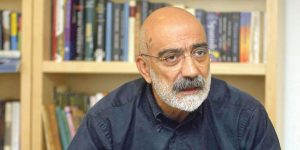 Ahmet Altan is one of over 150 journalists who is in detention in Turkey. Altan stands accused of “attempting to overthrow the government” and “attempting to eradicate the parliament” and they face three counts of life sentences without the possibility of parole.
Ahmet Altan is one of over 150 journalists who is in detention in Turkey. Altan stands accused of “attempting to overthrow the government” and “attempting to eradicate the parliament” and they face three counts of life sentences without the possibility of parole.
Altan, who testified on 19 September through the judicial teleconferencing system from Silivri Prison, mainly addressed the presiding judge. The next hearing in his case will take place on 13 November.
The belief that makes people gather around a religion is rooted in their trust in the honesty of God.
God cannot tell lies.
Lying would deprive God of his divinity.
In ancient times, even a pagan tribe that worshipped a pear tree believed in the tree’s honesty; that it would bear the promised fruit at the promised time.
Ever since people were created they have gathered around authority, worshipped it and entrusted themselves to it.
People who don’t trust each other, who divide into groups, tribes, and clans, can only come together around an authority which they trust to be honest.
In the same way that a person needs an honest authority in order to become religious, there is need for an honest authority in order for millions of people to become a nation and establish a state.
The honest authority which enables the millions to turn into a nation and establish a state is not one of politicians, soldiers, executives, or political parties.
That honest authority, that great source of trust, resides in the judges.
The magical link that turns millions of dispersed pearls into a necklace is the honesty of those judges.
Without judges, there cannot be a nation. Without judges, there cannot be a state.
What makes a nation and what makes a state is its judges.
In the same way that removing the oxygen atom from a water molecule turns the very source of life into one of death, removing the judges from the state turns it into an armed gang.
If there are no judges then there is no state.
When you remove the oxygen atom from a water molecule it no longer qualifies as water. Similarly, when you remove the judges from the state, the state no longer qualifies as a state.
What distinguishes a state from an armed gang is the presence of judges.
Well, then what makes this ever so vitally important judge a judge?
It is not his or her diploma, his or her cloak, his or her podium.
What makes a judge a judge is their possession of an almost godly honesty and the people’s undoubting belief in that honesty.
In the same way that there cannot be a lying God there cannot be a lying judge.
A judge would lose their qualification as judge the moment they were to lie in court.
If a state were to allow a judge who no longer qualifies as a judge to continue, that state would no longer qualify as a state.
A judge demolishes the state as they demolish their qualification as a judge by lying in court.
A year ago, Mehmet Altan and I were arrested on the charges of “giving subliminal messages to the putschists.”
Later on, this ridiculous allegation disappeared and we were sent to prison on the charges of staging the coup on 15 July and attempting to overthrow the government with weapons.
We are said to have staged an armed coup d’état.
This is the crime we are charged with.
This is a case in which the absurdity of the allegation overwhelms even the gravity of the charges.
Now, I’ll say something loud and clear to this court, to this country and to those around the world who have taken an interest in this trial:
Show us even a single piece of concrete evidence of the strange allegations against us, and I will not defend myself anymore. Even if I am sentenced to the gravest penalty I will not appeal the ruling.
I am saying this loud and clear.
Show me a single piece of evidence and I will waive my right to appeal.
I will submit to spending the rest of my life in a prison cell.
During this past year, which we spent in prison, a judge ruled each month for the continuation of our imprisonment by claiming that “there was solid evidence” against us.
In the previous hearing, you, too, said there was “concrete evidence” against us.
Now, for you to be able to preserve your integrity and your qualification as a judge and for the state to be able to preserve its qualification as a state, you need to show us what those pieces of “solid evidence” are.
Since you declared with such ease that there was solid evidence, that evidence needs to be in our case files.
Come on, show that solid evidence to us and to the rest of the world – the evidence which proves that we staged a coup on 15 July.
You won’t be able to show it.
Both you and I know that there is no such evidence.
Because these allegations are utter lies.
Go ahead, disprove what I have been saying, pull out that piece of evidence and show it to us.
There are some difficult aspects to arresting people on nonsensical allegations, Your Honour, and now you are confronted with those difficulties.
Either you will end this nonsense by saying “there is no solid evidence” or you will show us some “solid evidence.”
Or, you will insist on saying “there is solid evidence” while there is no solid evidence and thus lose your integrity and your qualification as a judge?
And with you, the state will lose its qualification as a state.
Thereby we will cease to be defendants.
We will become hostages of the judges, who have lied and therefore lost their qualification as judges, and to an armed gang, which has lost its qualification as a state.
Because in a real state with real judges there can be no allegation without evidence, there can be no trial without evidence, there can be no arrest without evidence.
Because a state, if it is to be a state, needs evidence to put a person on trial.
Only armed despots lock people away without evidence.
If you continue trying and incarcerating us without evidence you will demolish the judiciary and the state.
You will be committing a serious crime.
Turkey will turn into a jungle of thuggery and despotism, where the guilty try the innocent.
Now, you need to decide whether you are an honest judge or a criminal.
If you accept an indictment that makes such absurd allegations and declare “there is solid evidence” while there isn’t even a single piece of evidence, you’ll discover life’s capriciousness and will put yourself on trial while thinking you are trying us.
I wait for your decision.
As an aged writer, one much more experienced than you are, my advice to you is to save yourself, save your profession, and save your state.[/vc_column_text][/vc_column][/vc_row][vc_row][vc_column][vc_basic_grid post_type=”post” max_items=”12″ style=”load-more” items_per_page=”4″ element_width=”6″ grid_id=”vc_gid:1507033820060-8b45a65c-3de0-8″ taxonomies=”8607″][/vc_column][/vc_row]
[vc_row][vc_column][vc_column_text]
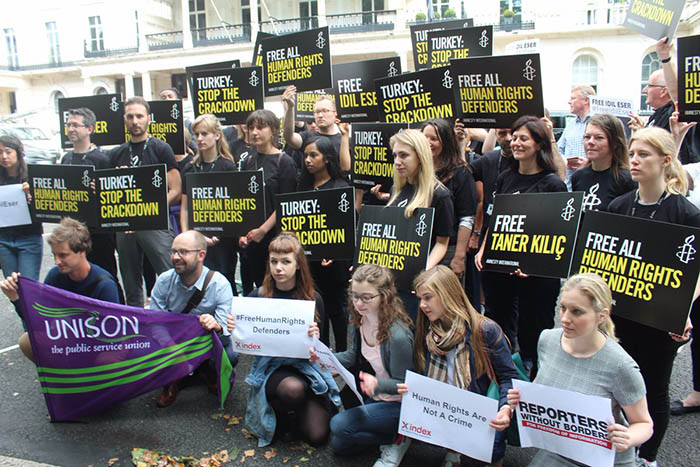
Credit: Cat Lucas, English Pen
Index on Censorship took part in a rally on 12 July at the Turkish Embassy in London to call for the release of Idil Eser, the director of Amnesty International Turkey.
Eser was detained along with seven human rights defenders and two non-Turkish trainers on 5 July while conducting a digital security and information management workshop in Büyükada, Istanbul. The protest marked the one week anniversary of their arrest.
In this special podcast, we asked representatives from Amnesty International UK, Reporters Without Borders, English Pen and Index on Censorship about the state of media freedom in Turkey and their messages for the detained human rights defenders.
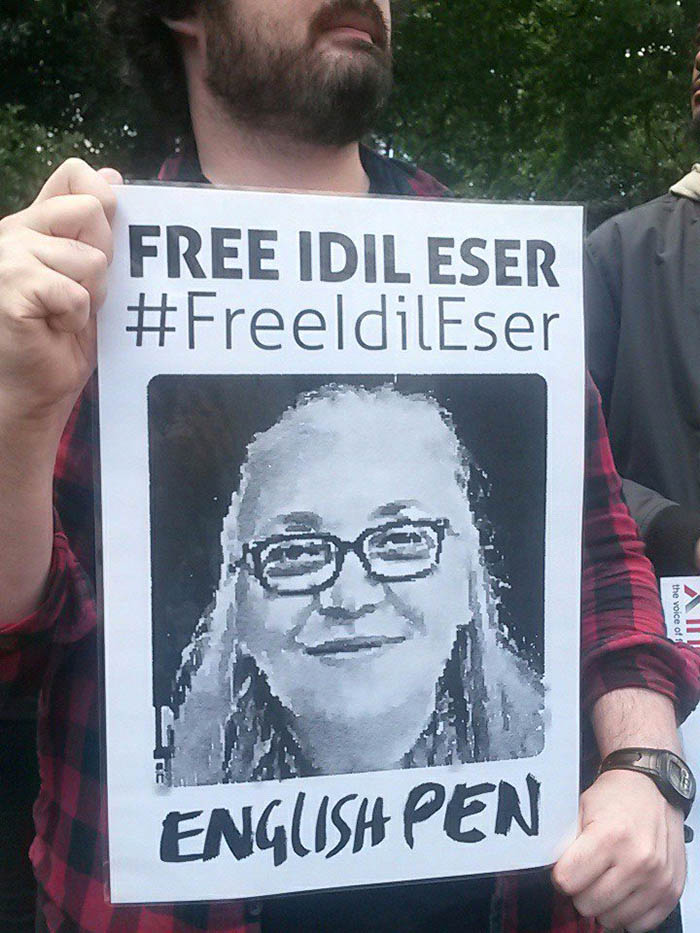
Credit: Cat Lucas, English Pen
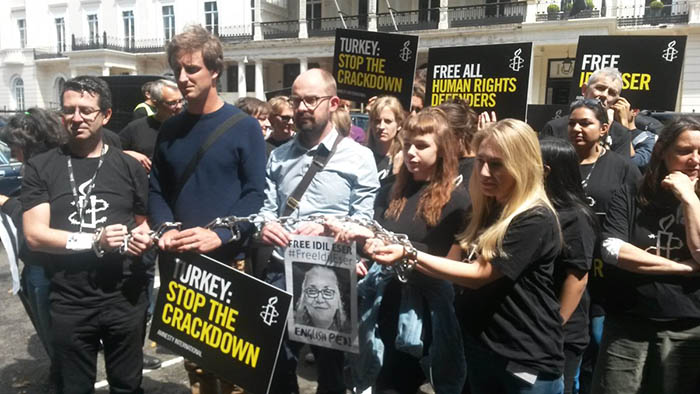
Credit: Cat Lucas, English Pen
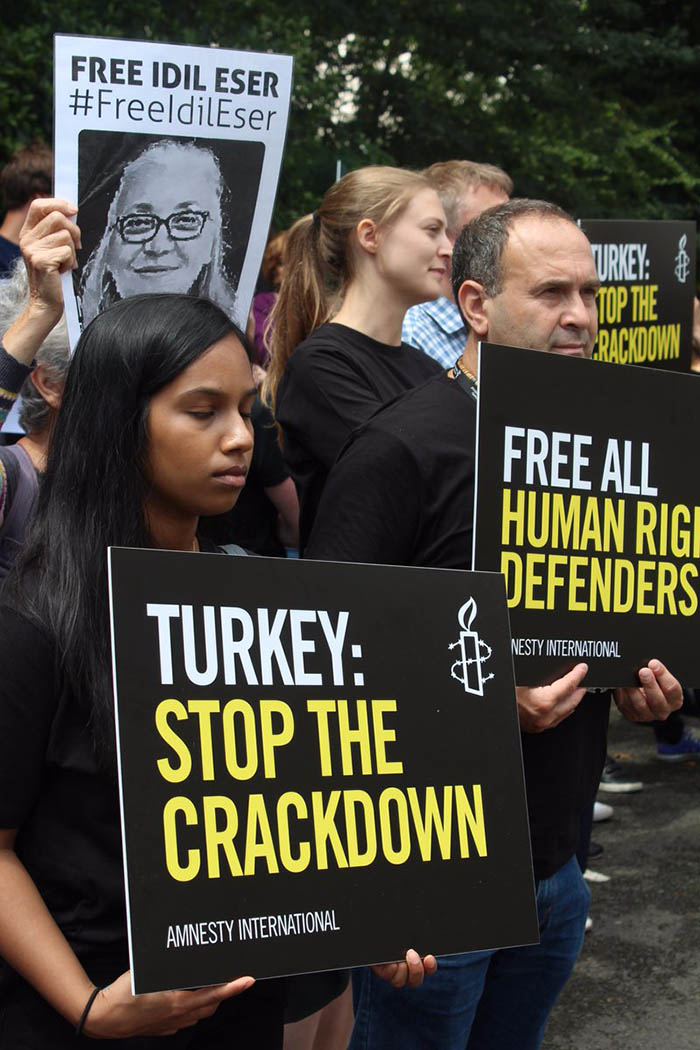
Credit: Cat Lucas, English Pen
[/vc_column_text][/vc_column][/vc_row][vc_row][vc_column][vc_basic_grid post_type=”post” max_items=”4″ element_width=”6″ grid_id=”vc_gid:1499960075571-a5ebc084-208c-2″ taxonomies=”55″][/vc_column][/vc_row]